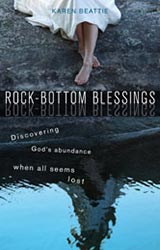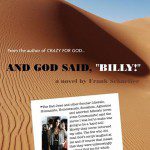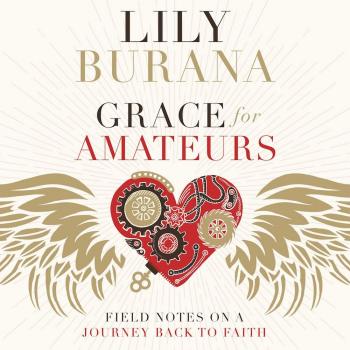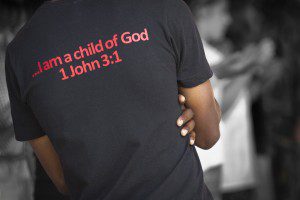 In the new book Rock-Bottom Blessings: Discovering God’s Abundance When All Seems Lost, Karen Beattie faces serious challenges: she loses her job, experiences a miscarriage, and encounters heart-wrenching difficulties in adopting a child. Her faith journey through her grief, loss and disappointment is at the heart of her book, now featured at the Patheos Book Club.
In the new book Rock-Bottom Blessings: Discovering God’s Abundance When All Seems Lost, Karen Beattie faces serious challenges: she loses her job, experiences a miscarriage, and encounters heart-wrenching difficulties in adopting a child. Her faith journey through her grief, loss and disappointment is at the heart of her book, now featured at the Patheos Book Club.
We had a chance to ask Beattie a few questions about her story, including what inspired her to write her book, her thoughts on “abundance,” and her conversion in her late 40s to Catholicism.
This is an honest and very personal book. What inspired you to share your story in Rock-Bottom Blessings?
 In 2009 I was laid off from my job, my husband was in school to change careers, and because of our lack of money, we had to put a long-awaited adoption on hold. I originally wrote the book to work out my own feelings and thoughts about what was going on. I was a good Christian – doing all of the right things. So why wasn’t God “blessing” me? I had picked up all of these ideas about God that were so wrong.
In 2009 I was laid off from my job, my husband was in school to change careers, and because of our lack of money, we had to put a long-awaited adoption on hold. I originally wrote the book to work out my own feelings and thoughts about what was going on. I was a good Christian – doing all of the right things. So why wasn’t God “blessing” me? I had picked up all of these ideas about God that were so wrong.
The author Parker Palmer once said “I write because I was born baffled.” I was born baffled, too. And writing helps me to understand. Another way to say it, and this I learned from a writing professor, is that “We write to find out what we know.” I was hoping that by working through all of these questions for myself, I would I some way help other people who were struggling with the same questions.
Much of your faith struggle in Rock-Bottom Blessings centers around money, or the lack there-of. How would you describe your particular journey with money — where it began and where it is now?
That’s a complicated question. I’m still trying to figure it out. In our society, money is not something like to talk about. Discussing our personal finances is a bit of a taboo. And one of the reasons I wrote this book was to bring the topic to the light and start a conversation about how our idea of abundance often has to do with our view of money.
Money affects every part of our lives – our relationships, our freedom, our security, whether we decide to have children or not. I grew up in a fairly upper middle class home, but there was a lot of anxiety about money. My father was a great provider, but I know he worried about supporting us. My mother used shopping as a way to cope with the stress of raising five children, which I totally understand. But there were a lot of mixed messages.
On top of that, our society tells us that if we just work hard enough and “pull ourselves up by out bootstraps,” we can be financially successful. And our churches – even if they are not prosperity gospel churches per se – imply that if we do all of the right things, God will “bless us” financially. I don’t think those things are true.
So all of these different messages have made me a little schizophrenic about money.
Writing this book was one way I was trying to unravel all of these messages. My vision, and I’m not sure I’m quite there yet, is to have a healthy, peaceful relationship with money. I want to be grateful for what I have, trust God to provide, and also try not to equate living an abundant life with having a lot of material wealth.
Yes, your book becomes more than anything a meditation on the word abundance. What was your starting description of that word, and what has it come to mean for you now?
I used to think abundance meant having a nice home, getting everything you wanted, having things go your way, enjoying financial security. Basically, being comfortable and happy and financially secure. Now I think of abundance as the transformation we experience in the midst of struggles. I think it’s about embracing the chaos and losses in life – because what happens in those difficult times is often miraculous in many ways. If you believe in the paschal mystery – the life, passion, and resurrection of Christ – then you can believe that resurrection can come even in the most difficult circumstance. I’ve also started seeing abundance in the minutia of life, like sitting with my daughter on the deck eating popsicles in the summer, or seeing the full moon shining across Lake Michigan. My view of abundance has both expanded, and become more focused.
You write of a “Ghost God” that helped you to see your past differently, and offered hope for your current challenges. What is the Ghost God for you?
There are times when you don’t think God is present in your life. He is silent, and he has “left the building.” During our financial crisis and my layoff, I couldn’t see God anywhere. I kept thinking – if I only saw a reason why all of this was happening, then I could endure it. If I could only catch a glimpse of God, I would have hope. But often, when you look back on events or the timeline of your life, you realize that God really was there, but he was lurking somewhere in the background, and you couldn’t see it at the time. In Flannery O’Connor’s novel Wise Blood, the character Hazel Motes says that Jesus is like “a ragged figure flitting from tree to tree at the back of his mind.” I can relate to that.
As part of your journey, you sought out a number of people of faith — a spiritual director, a financial planner at a mega-church, a Catholic priest — as well as explored a number of spiritual practices — the Spiritual Exercises of St. Ignatius, a Buddhist practice of praying for your “enemies.” Who and what’s been the most helpful to you in your own faith journey?
Going through the spiritual exercises of St. Ignatius had a huge part in transforming my faith, and was the turning point, I think, in my acceptance and peace about my situation. I learned that St. Ignatius, hundreds of years ago, was struggling with the exact same things that I was struggling with – being drawn to material wealth, wanting the riches of world and the world’s definition of success.
In the First Principle and Foundation of the spiritual exercises, St. Ignatius writes, “As far as we are concerned, we should not want health more than illness, wealth more than poverty, fame more than disgrace, a long life more than a short one, and similarly for all the rest, but we should desire and choose only what helps us more towards the end for which we are created.” I taped this to my bathroom mirror.
Part of your particular journey was converting to Catholicism in your 40s. What was it about the Catholic faith that drew you, especially during and throughout the challenges you recount in your book?
When my husband and I first walked into Old St. Pat’s in Chicago, we immediately felt like we were home. It was a bit like falling in love. I grew up in a Baptist church, which was very fundamentalist and interpreted scripture literally. Richard Rohr writes in his new book, Immortal Diamond, “Literalism is the lowest and least level of meaning.” I agree. And at some point it wasn’t enough for me. In my 20s and 30s, I spent a lot of time going to various non-denominational evangelical churches. After a while, I just felt like it wasn’t working any more. I needed a different language, and different rituals, to find God again.
There’s something to be said for beauty. When we entered Old St. Pat’s for the first time, we walked into a gorgeous sanctuary that had been built by Irish immigrants in the 1850s. The stained glass…the intricate Celtic-inspired designs on the walls and ceilings. I thought, “This beauty is worthy of my faith.” I needed tangible reminders of God – beauty, art, the Sacraments, the Sign of the Cross, the icons of the saints, signposts to point me to God until I could believe again. I was drawn to the fact that Catholics are much more comfortable with mystery and metaphor.
What was the hardest thing about writing this book? What was the easiest?
Writing has always been difficult for me. Trying to capture my feelings and thoughts on the page is excruciating. I never feel that it’s good enough. It was also hard just to get it done. I was sending chapters to my editor as I was writing. My goal was to send her a chapter a month. Having that accountability was great because there were so many times I wanted to quit. I would lose momentum, or feel that I had nothing more to say. I work full-time, so sitting in front of a computer all day, and then coming home and opening the computer again to work on the book was the last thing I wanted to do. But I also knew I needed to tell my story. I was compelled to get it out and on the page.
The easiest part, to be honest, was getting it published. I shopped the idea of the book around to a few people, but then I met with the wonderful folks at Loyola Press and they were so encouraging. I knew that Loyola Press was where this book belonged. It just seemed to fall into place. I know many other writers will hate me for saying that.
What do you most hope people take away from Rock-Bottom Blessings?
I think many people feel like they’re doing something wrong – that it’s their fault if their lives aren’t perfect, or they aren’t succeeding, or their dreams are unfulfilled. “What am I doing wrong?” “Is God punishing me?” “Does God love me?” I guess I want them to know that they are loved. That Ghost God is lurking behind the trees. And that resurrection can happen even in the most difficult circumstances.
Visit the Patheos Book Club to read an excerpt from Rock-Bottom Blessings.













